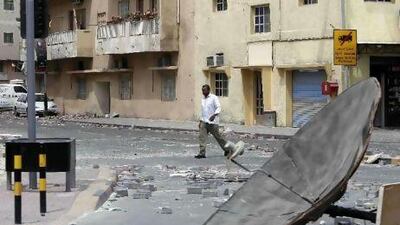MANAMA // Security forces surrounded Bahrain's main hospital yesterday during a crackdown on protesters as the UN human rights chief warned that reported takeovers of medical centres violate international law.
Empowered by state-of-emergency regulations announced on Tuesday, shotgun-toting, white-helmeted police manned checkpoints around Manama's Salmaniya Medical Centre yesterday, questioning people but not preventing them from entering the hospital.
State media said security forces had "cleared" the hospital of "saboteurs", after police firing tear gas and shotguns on Wednesday cleared a pro-democracy sit-in at Manama's Pearl Roundabout.
An opposition MP, Khalil al Marzouk, said Dr Ali al Ekri was arrested yesterday at Salmaniya hospital. A state television anchor had earlier mentioned Dr Ekri as someone spreading "fabrications" about the conditions of the hospital.
Rights groups have accused the security forces of preventing those injured in the operation from reaching hospitals and of beating medics trying to collect the wounded from the streets.
Amina Hasan, a doctor in Sitra south of Manama, said his medical centre received 15 people yesterday who were suffering from shotgun wounds inflicted during confrontations on Wednesday.
She said that they had not been able to reach the centre on Wednesday because the roads were blocked by security forces.
Bahrain's health minister, Nizar Baharna, a Shiite, announced his resignation after police were alleged to have burst into a Manama hospital on Wednesday.
The UN High Commissioner for Human Rights, Navi Pillay, said: "There are reports of arbitrary arrests, killings, beatings of protesters and of medical personnel, and of the takeover of hospitals and medical centres by various security forces.
"This is shocking and illegal conduct. Police and armed forces must immediately leave health care facilities and cease their harassment and intimidation of health professionals," she said.
The International Federation for Human Rights said it had received reports that Bahraini doctors had been "routinely threatened with violence to themselves and families and arrest, by unknown phone calls".
The group also quoted accounts of government forces surrounding Bahraini hospitals and reports that they had "attacked doctors trying to help the wounded".
Amnesty International has also reported cases of injured people being blocked by police from entering medical facilities, and of security forces targeting medical workers.
The few cars on the streets of Bahrain yesterday picked their way nervously through the rubble and roadblocks, their occupants stopping to show identity cards to soldiers brandishing rifles and backed by tanks.
Overturned skips and shopping trolleys still block side roads, but the main streets have been opened up since security forces drove demonstrators off the streets on Wednesday and cleared the Pearl Roundabout, the focal point of weeks of protests.
After days of closures, cars queued around the block at a petrol station in Sar, an area under a strict 12-hour curfew. Most shops were closed, their metal shutters drawn. Banks were shut and people were lined up at cash machines.
At one of the few smaller supermarkets that dared to open, shoppers filled their trolleys with supplies to see them through the unrest that has sucked in neighbouring armies and prompted martial law.
The bread section was empty by 11am.
Mohammed Salman, who was waiting for the till, said: "There is a curfew here from 4pm to 4am and people need food. It is like the siege of Gaza here; we are cut off.
"Yesterday we had no food. We slept hungry. There was nothing in the fridge, so now people are being careful in case this escalates. People are taking precautions for several days. This is the first time this has happened in Bahrain."
The supermarket, like most shops and businesses in Bahrain, was closed on Wednesday, when troops cracked down on protests.
Milk and other fresh goods had begun to run out earlier in the week, but the shelves were being restocked yesterday.
Nasser Bahri, who was pushing two trolleys containing food and fresh milk towards the checkout, said: "We're just getting enough for the kids. We're not afraid. Whatever happens happens."
In different spots around Manama, concrete blocks and metal barriers slowed down traffic and funnelled it towards troops in charge of Bahrain since martial law was declared on Tuesday.
The ruling al Khalifa family imposed martial law after a wave of protests by Shiites demanding that the government give them rights in jobs and politics on a par with their Sunni compatriots.
Helicopters buzzed constantly over streets strewn with stones, planks of wood and metal, remnants of makeshift checkpoints set up over the past week by vigilantes guarding their neighbourhoods as sectarian tensions flared.
The major shopping centres - Bahrain Mall, Seef Mall, Dana Mall and City Centre Mall - have been closed since protesters blocked off the main thoroughfare to the financial district on Sunday. Now troops stop and search passing cars instead.
Assault rifles slung around their necks and balaclavas covering their faces, troops in desert-coloured fatigues stopped and searched cars on the thoroughfare leading to the main financial district of the Gulf Arab banking hub.
Near the Pearl Roundabout, troops pulled three men out of their cars, forced them to squat at the side of the motorway and handcuffed their hands behind their backs.
At another location, armed police pulled a driver out of his car after finding a red-and-white Bahraini flag, which had become a symbol of the uprising in recent weeks.
Police and security personnel now fly the flag instead, to show that they are Bahraini troops, not the Saudi forces that have been called in to help, and to reclaim the flag for the state.
* Agence France-Presse with additional reporting by Reuters

